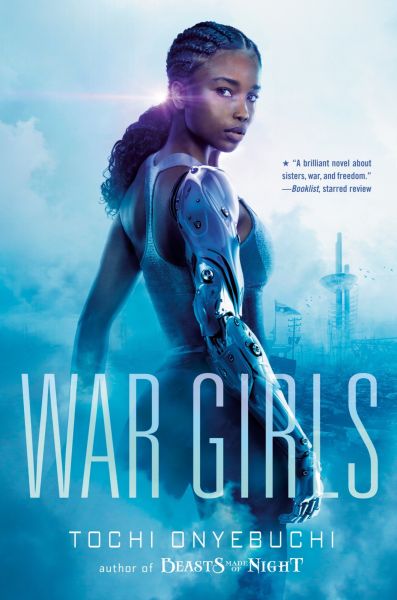Burn Brighter Than The Sun
War Girls
By Tochi Onyebuchi

18 Oct, 2019
0 comments
Tochi Onyebuchi’s 2019 War Girls is a MilSF novel.
The Western powers — the oyinbo — gave the world the gifts of climate change and nuclear war. In the aftermath of the war, nations like America and Britain established glittering space colonies. Many nations succumbed to fallout. Nigeria, on the border of the uninhabitable zone, home to mineral riches, fell back on the familiar habits of civil war: Biafra’s Igbo against everyone else.
Young Onyii is already a seasoned veteran; the loss of an arm has only strengthened her desire to see Biafra free of Nigerian and oyinbo interference. Her only distraction from patriotic fervour is her adopted sister Ify, whom Onyii rescued after Ify was orphaned as an infant. The two sisters live in a camp hidden from Nigerian sensors.
But not hidden well enough.
The camp is obliterated, and Ify vanishes, carried off by the Nigerians. Without Ify, Onyii has nothing to distract her from the war. Perhaps she will find her sister and rescue her. Perhaps the Nigerians will end her grief by killing her. Until then, Onyii will make the Nigerians pay a bloody price for taking her family from her.
The Nigerians would argue that they rescued Ify. She is not being treated as an enemy combatant but rather a traumatized child who merely needs the right education to become a proper, patriotic Nigerian citizen. After all, Ify is not an Igbo, but a Nigerian who somehow fell into rebel hands.
Four years pass. Cunning and determination win the Biafrans international recognition of their sovereignty and peace with Nigeria. This is not a world for which Onyii is adapted. Having spent most of her life massacring Nigerians, she is short on skills useful in a peaceful world.
No worries! Not only does Onyii have a very good change of being offered up as a sacrificial defendant in a war crimes trial, the Nigerians have spent four years creating a very special weapon aimed directly at Onyii: Ify, who has finally learned precisely by whom she was orphaned as an infant girl.
~oOo~
The ad copy on Amazon bills this novel as “a futuristic, Black Panther-inspired Nigeria,” for much the same reason any new Scandinavian novel is pitched as being in the tradition of The Girl With the Dragon Tattoo, regardless of actual themes or content. The ad copy is aimed at North American readers, who are assumed to be blithely ignorant of the rest of the world. Each region of the world outside the North American continent is granted one best-seller media work, to which all other works from that region will be compared. Sales, you know.
In this case, anyone who bought this book looking for another Wakanda would be disappointed. Wakanda carefully avoided conquest by foreign powers; it controlled its own mineral resources. The Nigeria in this book (and in real life) is nominally sovereign but has long been subject to the machinations of colonists eager to exploit its resources. Onyebuchi has modeled his futuristic Nigeria on Nigeria itself, specifically the Nigeria (and Biafra) of 30 May 1967 to January 1970. Two worldwide catastrophes (climate change and nuclear war) shape the overall setting, but the war recounted in the book is a recapitulation of the 1967 – 1970 Civil War, atrocities and all, albeit with a far more optimistic outcome for Biafra.
This isn’t the first Biafran War inspired work I’ve encountered this year. It is in fact the third. You may wonder “why so many?” I wonder why so few? I mean, there are hundreds of American Revolution knock-offs.…
The other model Onyebuchi has in mind is Yoshiyuki Tomino’s Gundam franchise. He imagines a Biafran War fought with advanced mecha. Mecha aren’t my thing. The fabulous mechanical giants look great on a screen — but would present such a large silhouette that their lifespan on an actual battlefield would surely be limited. Gundam is a wildly successful franchise; clearly I am in the tiny minority here.
In the end, what the reader gets is an 1980-style military SF novel (specifically of the Japanese giant robot variety). That is, if 1980s MilSF had been inclined to acknowledge Africa’s existence in ways that acknowledged Africans as people (with all the implied virtues and vices) rather than victims to be saved, or lost peoples irrefractably damaged by a tragic past that certainly has nothing to do with the author. While the technology doesn’t convince me, the main focus is on the way that war has shaped the book’s two main characters. That part of the novel pays off..
War Girls is available here (Amazon), here (Amazon.ca), here (Amazon.co.uk) and here (Chapters-Indigo).
